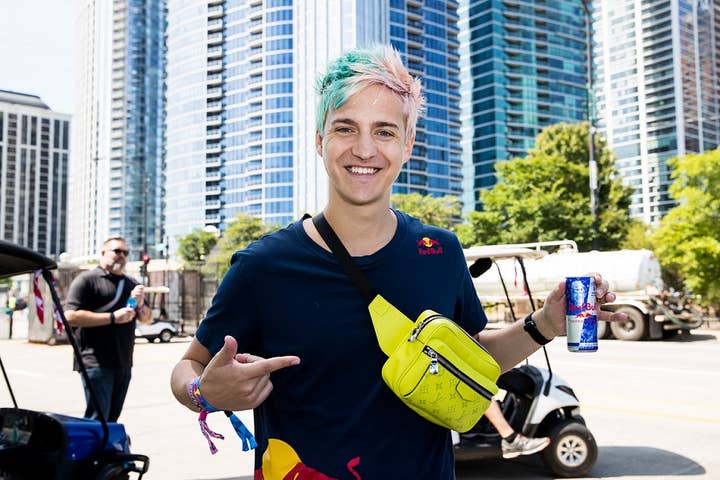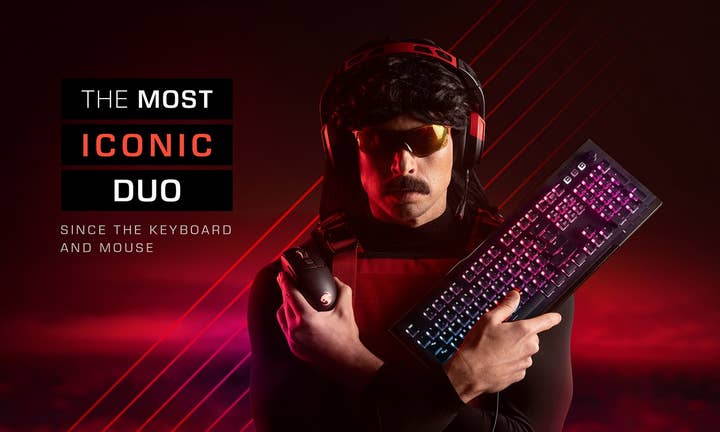What's fueling gaming content creator deals?
CAA agent Peter Letz assesses the platform exclusivity trend and the surge in non-endemic brand interest in gaming personalities
For the last 18 months, Peter Letz has been working with Creative Artists Agency as an agent in the firm's Digital Media department focused on gaming content creators. In that timee's represented DrDisrespect, Nick Eh 30, Game Grumps and other streamers, YouTubers, esports hosts and stars, and even podcasters.
Those categories have been around for a lot longer than that, but Letz tells GamesIndustry.biz that the business surrounding them has changed dramatically over the last few years.
Twitch and esports have grown on their own merits, Letz says, but that growth has been amplified by interest from cultural icons and investors alike.
"You're looking at Drake and big pop stars who love gaming or you're looking at the most prestigious [venture capitalists] in the world investing in esports teams and leagues," Letz says.
More money and attention being directed at these spaces means more deals for Letz and his clients. And as anyone who's followed news from the livestreaming platforms in the last year knows, some of the most noteworthy pacts of late have been exclusivity deals.
Last August, Ninja signed a deal to stream exclusively on Microsoft's upstart streaming platform Mixer, leaving behind a Twitch channel with more than 14 million fans to build from scratch on a fledgling service. In the months that followed, the major streaming platforms traded blows, landing an assortment of exclusivity deals with their own content creators in a flurry of announcements.

Letz says that exclusivity itself is not a new thing in the streaming scene, as the Twitch partner agreement required it in the first place.
"What was new became a number of other platforms saying, 'This is enough of a whitespace in terms of the growth of livestreaming, so let's start spending money to attract top talent,'" Letz says. "And then by proxy, platforms having to spend to retain top talent."
He also questions the narrative of the Ninja signing as a flashpoint for the flurry of exclusivity deals we've seen in the space.
"I think it went on in the background for a long time where there were maybe less publicized deals happening or deals that weren't publicized," Letz says. "For most people it caught the popular consciousness when Ninja moved from Twitch to Mixer, and the perception was the deals thereafter were all cascading reactions to that. The truth is a little bit more complicated.
"Certainly, that move was a stake in the ground to say that people were willing to make this move, and it certainly amped up a certain element of urgency on it. However, a huge number of the deals that ended up happening were being negotiated prior to that deal being public. So the desire for various competitors to go after and retain the talent was happening previously; it just hadn't come out yet."
"Where there's talent and demand for talent, you're going to get some version of deals where people are locking up talent exclusively in some way"
Letz says the push for exclusivity is common to any number of other fields, like pro sports leagues competing over big-name stars or film production companies signing creators to multi-project deals.
"It has a lot of comparables to other industries," he says. "I just don't think we know yet how the industry is going to settle out in the long term. What are these deals going to look like in two years? We're in a moment where a bunch of these deals got made and it made sense. There's just always going to be demand for talent. Where there's talent and demand for talent, you're going to get some version of deals where people are locking up talent exclusively in some way."
He adds that it's too early to evaluate the effectiveness of those exclusivity deals just yet, and adds that different platforms will be using different metrics to evaluate them, depending on their strategy.
"One platform might say it just needs brand-safe inventory for advertisers," Letz says. "Others might be saying they have plenty of inventory for advertisers and they need to retain the talent that seems qualitatively and artistically special. So each platform is going to have a different metric to evaluate it. I think we're probably too early -- and there probably hasn't been enough movement -- to say that at a platform level, viewership is being affected by these moves."
The "brand-safe" aspect of content creators is one that comes up regularly, as a number of popular content creators have built followings by toeing the line of acceptability. Some have even crossed it from time to time, like when Disney and Machinima dropped PewDiePie and YouTube cancelled a show it was creating with him after he made a series of anti-Semitic jokes and comments, including paying two men to make a video of themselves holding up a sign reading "Death to all Jews."
"I think livestreamers inherently put themselves in a position where it's easy to have something that might be a slip-up at some point"
"I think with any celebrity or talent in the spotlight, you're going to have times where there's a controversy," Letz says. "They're under the microscope. So it's not so different from other celebrities. Where it is certainly different for the livestreaming side is you have the camera on you for eight hours a day live, [improvising] and trying to be funny and engage your fans over an extremely long period of time, day after day with no censorship. Are you going to say something that is going to be offensive or not hit the right note? I think livestreamers inherently put themselves in a position where it's easy to have something that might be a slip-up at some point."
That said, Letz says it hasn't really affected CAA's business with content creators much.
"We tend to work with people who are on the end of being very buttoned-up, professional, more mature," Letz says. "We're looking for entrepreneurs, people who want to extend their businesses. We're working a little bit less with the super-young content creators, at least on the gaming side. Challenges are always going to come up with talent, but it hasn't had a hugely meaningful effect on the business side."
For evidence of that, we can look at DrDisrespect. The Twitch streamer has drawn criticism for using a racist accent, and last year was temporarily banned from Twitch for livestreaming himself in public bathrooms at the Electronic Entertainment Expo. Even after those events, Letz brokered a book deal with Simon & Schuster imprint Gallery Books for a comedic in-character memoir, a deal for a TV series with Skybound Entertainment, an exclusivity deal to keep him on Twitch, and a sponsorship deal with peripheral maker Turtle Beach.

Still, there are plenty of brands that still aren't comfortable enough with the gaming content creator space.
"I think there are non-endemic brands that need time to be educated on the space, find the right people that are the fit for them that they feel comfortable with," Letz says. "But I don't see people pulling out of the space. Any new medium someone is going to market against for a gigantic company -- especially incredibly conservative Fortune 500 brands that want to get into any new marketing space -- there's going to be a lot of education and time to walk them through that.
"Certainly there are times when people are like, 'Gaming? I don't know if I want to be in gaming. What's gaming? What's livestreaming? I saw some articles where people said it's really toxic in chat.' And you're going to have to educate people who are not familiar with the space. But it doesn't feel like it's unique from getting any brand to spend in a new space that they're not already in. There are perceptions of what gamers are that you have to get past in terms of helping people understand this is an audience they want to reach."
While endemic companies and advertisers have always played a big part in this market, Letz says he's seen a shift toward non-endemic advertisers of late.
"The difference between today and three years ago is astronomical," he says. "Every major brand is at least having the conversation. Even if they're not spending, they are talking to creative agencies, they're talking internally, they're asking what their plan is for gaming. It might come out that they're not sure yet, they're nervous about it or not decided and going to do a test, but everybody is at least talking about it. And that is a pretty astronomical change. We are seeing eight-figure and above spends from non-endemic brands that a few years ago would have spent zero on the space.
"There were always going to be non-endemics that are way ahead of it. Coke, Red Bull, Monster, and Intel were in this well in advance of the current climate, but we're seeing a huge increase in interest. It just takes a lot of education and time to walk through what it is, but it's an exciting time to be in the space not only in terms of interest in brands, but a big part of our focus is in expanding our talent into new business lines and new media. "
